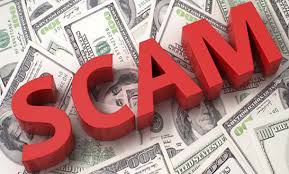Top 10 new scams fraudsters use that look legit
 Top 10 new scams fraudsters use that look legit
Top 10 new scams fraudsters use that look legit
Criminals always develop new scams as they pursue your money and identity in an unending search. Here’s a closer look at a few more prevalent, relatively new scams.
What Is Fraud? What Are the Risks?
Fraud is a broad legal word that describes circumstances in which someone purposefully acts dishonestly to gain something from another person, company, or institution. Fraud almost always aims to make money or obtain a financial advantage. However, that isn’t the only reason someone might try to cheat you or your company. They might also want particular products or services you wouldn’t often offer them.
By openly lying to you, fraudsters may try to coerce you into giving them what they want. They could also falsify information and omit crucial details while submitting applications. They might even impersonate someone else, committing identity theft.
Fraud includes many different types of crimes and con games. However, the majority of fraud instances fall into one of two categories:
- Business fraud happens when clients, staff members, or investors defraud your company for cash or goods.
- Personal fraud happens when someone, a group, or an organization cheats you into parting with cash, goods, or private information that might be used to steal your identity.
Consumers have had a challenging year, but con artists have profited from the pandemic by using it to commit ever-more lucrative crimes. 41.49 per cent of consumers who complained to Fraud.org claimed a loss, which is more than one in four. Even while that percentage decreased slightly from the 43.19 per cent who reported losses in 2020, the median fraud loss was still the biggest since 2012. It was $800. Nearly half (47.48 per cent) of all complainants reported a loss in 2019, which marked the highest percentage of complaints that included a documented loss. This rise may be ascribed to the effectiveness of con artists’ methods, a decrease in customer resistance to deceptive tactics, or a mix of the two. The top dangerous con games to watch out for are:
- CEO fraud
This one focuses more on businesses. The con artist identifies the individual who controls money within a company. They then ask for money to be moved to a particular account while pretending to be someone in a position of power, such as the CEO.
With so much information available on LinkedIn, it’s quite simple for scammers to decide who to target and concoct plausible tales. This kind of phishing calls for some planning because the con artist must act convincingly like the executive they are impersonating. The fraudster will next get in touch with a firm employee who can transfer funds and instruct them to do it on the scammer’s behalf.
As with most phishing schemes, CEO phishing is most effective when there is a sense of urgency or emotionalism added to the request. As a result, many CEO phishers would target newly hired finance department employees in the hopes that they are unaware of all the potential measures that may be in place to stop the scam from functioning.
- Cloned websites
Since it’s simple for scammers to clone a website to make it resemble a site you know and trust, people should be cautious of any unsolicited emails they get. They can give you a voucher for a discount, and when you click it, it will transport you to a false website that resembles the actual one. Remember that fraudsters may not always seek out your credit card details. You might only be prompted to log in on the fake website before being forwarded to the legitimate one, rendering you unaware that you were on a fake page. A criminal can access your account and make fraudulent purchases with your login information.
It’s important to look for the lock icon or the ‘https’ in the browser, which denotes a secure site. Observe the URL address as well. Cloned site URLs will resemble the original site in appearance but will differ slightly. For instance, if scammers want to make people believe they are on amazon.com, they might use a website address like Amazon-12345.com.
- Fake downloads and antivirus software
The files you view when browsing the web don’t officially enter your computer. Instead, they are merely presented on your browser by the pertinent servers. If you download from dubious websites, you risk installing malicious malware on your computer because when you click “download,” the files are loaded into your hard drive.
Malware, or software made specifically to gather data from your computer, is one of the most frequent things you may get. If you find it in time, you can typically get rid of it before it affects your computer’s functionality, but it might already be too late.
Ransomware is yet another program that you could unknowingly download. This malware will lock you out of your computer and demand money to let you back in. DON’T BE A VICTIM OF THIS. Instead, visit a professional with your computer, or if you know how, reset it to a time before the download.
A pop-up message claiming that your computer has a virus may occasionally be sent to you by hackers. You can download security software that will infect your machine with malware in the same pop-up. Once more, if in question, don’t click. Make sure to prioritize privacy and security. Not all antivirus programs are created equal; some, like Avast, provide a comprehensive solution for all online security requirements.
- Dating and Romance Scams
Unfortunately, fraudsters are willing to take advantage of this vulnerability since they know the incredible things loneliness can do to the human psyche. These heartless hackers will create an online dating profile and attempt to get to know you. They will eventually urge you to send them money, and since you have grown to care about this person, you will be inclined to do so. Though it’s simple to say you won’t be duped, you can never be sure. The best course of action is to remember that you should never pay money to someone you haven’t met in person.
- Fake lotteries
What is known as the “fake lottery” fraud is precisely what it sounds like, and it is another popular scam you will run into online. This trick involves someone getting in touch with you and telling you that you’ve won a sizable jackpot, generally in another nation. However, you will have to divulge some private information to receive your “reward,” which is a major red flag. Just recall a time when you might have participated in a lottery and received a message like this. It must be a hoax if it’s from a place you’ve never been to. But remember that there’s a good probability someone is up to no good if they give you a lot of money for doing nothing.
- False surveys
Surveys are a tried-and-true method for businesses and other organizations to learn more about their target customers. However, this is almost certainly a fraud if you are requested to provide information to complete a survey. Take surveys only when they originate from reputable companies and institutes. For instance, it’s generally acceptable if you purchased a product from a firm and then received an email from them asking for feedback. Even so, it is still best to avoid participating in surveys if you are asked to provide information like your address, social security number, account details, etc.
 Top 10 new scams fraudsters use that look legit
Top 10 new scams fraudsters use that look legit
Read Also: Top 10 technology tools that make life simple for business owners
- Account failure or problem
Stop and look online for an explanation if you receive an email from a service you use informing you that there is an issue with your account that has to be fixed immediately. It’s probably a fraud if you can’t find one, but you may also call the business to see if there’s a problem. The Netflix scam is a prime illustration of this scheme. Scammers, in this instance, state that there is an issue with your account and that they need your data to rectify it. Users of Netflix were specifically informed that their payment information was a concern. They were prompted to input their account again to keep it active, which immediately gave the bad guys access to their credit card information. Make sure to research any website before entering your personal information because there are innumerable scams like this one.
- Fake charities
It is simple for us to feel pessimistic about the world because of this specific con. Particularly following a significant natural disaster or other catastrophe, con artists will solicit donations for charities that don’t exist. Instead, the cash is immediately placed in someone else’s pockets. Only give to renowned organizations like The Red Cross when a significant event occurs. Before donating money to anyone claiming to help, check the government’s list of recognized charities, typically published during high giving periods.
- Pre-approval scam
Accepting a credit card offer could be tempting if you’re under financial pressure to accept one because you’ve been “pre-approved.” These offers typically have huge credit limits and cheap interest rates, which adds to their allure. However, there is a catch—even if a credit card company charges you an annual fee, they will never require you to pay all the fees upfront. No one will ask you to pay this upfront because many credit card firms do this, making it simple to believe that these false offers are real.
- Digital Greeting Cards
Despite their decline in popularity, greeting cards are still a delightful method for people to communicate with one another. But if you don’t take precautions, opening a card from a con artist may start a download on your computer, giving you a harmful program that can steal your data and ruin your life. These can occasionally originate from someone you know, making them difficult to recognize. But if someone you haven’t spoken to in a long time or with whom you regularly connect via other channels suddenly sends you a card, think about texting or calling them first to safeguard yourself from whatever lurks within.
Hope you enjoy this article?
Share your thoughts in the comment session.
Contact us today for your business consultancy and business advisory services. We can help you fine-tune your idea, structure your business, market your business, train your staff, consult on your retirement plan, coach you for financial success. We also write a business plan and help with fundraising strategies and Grant applications. We can help you start, grow, and expand your business.
We help institutions and organizations write concepts, implement Business plans, and train on business Plan writing in Nigeria.
We can help you write a detailed, bankable and comprehensive business plan for your business idea.
Call any of our business plan consultants on 08105636015, 08076359735, and 08113205312.
Or send a WhatsApp message or email us either at dayohub@gmail.com or info@dayoadetiloye.com.
Related